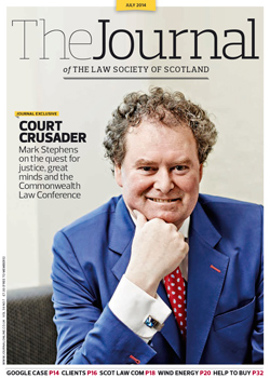Opening up the law

Three-pronged approach
Rob Marrs offers an overview of the Widening Participation forum
As part of its “Fair Access” programme of work, the Law Society of Scotland hosted its first Widening Participation forum on 12 June. This brought together more than 60 delegates from universities, in-house organisations and private practice.
Vice President Christine McLintock started the day by explaining the fair access work that the Society is currently undertaking, stating the fundamental importance of fair access to the Society and the profession.
The first session saw presentations on what the universities are doing from Lindsay Jack (Edinburgh), Dr Frankie McCarthy (Glasgow), and Kirsty Summers (Edinburgh Napier). Jack explained her university’s use of contextualised admissions – where they look at the whole person rather than the grades. She noted that such an admissions policy is not always as understood as it might be by legal recruiters. She also focused on an array of programmes the university runs to assist individuals from non-traditional backgrounds to arrive and thrive at Old College.
McCarthy noted that Glasgow also operates contextualised admissions, and explained the support services Glasgow offers its students during the degree and diploma and after. She also covered the widening participation schemes, Reach West and the Access Programme.
Finally, Summers focused on Edinburgh Napier’s innovative Employer Mentoring Service, which links undergraduates with employers. A solicitor with TSB, Mickey Breen, who has mentored on the programme, attested to how much benefit it gives to the students, and to those mentoring.
In the second session, delegates were asked to split into groups and to consider scenarios coming out of the Society’s annual DPLP survey. This allowed delegates to see the real issues of access that the Society, and profession, face. It generated a lot of good ideas which the Education & Training Committee will consider over the coming months.
The final session saw three speakers from private practice describe how their firms are trying to improve fair access. Wendy Anderson (Ledingham Chalmers) gave an overview of the issues facing the profession, asking how it could remain attractive when the path to partnership was often a long one. Carole Ritchie (Shepherd & Wedderburn) spoke about her firm’s commitment to the Prime initiative, which offers work experience to schools that do not often produce lawyers. A graduate of that programme (now an LLB student) and a school pupil gave their thoughts on how Prime had benefited them, impressing the forum with their knowledge and enthusiasm. Finally, Rob Powell of CMS Cameron McKenna explained what the English offices of his firm are doing to assist fair access. He is excited about now working to a far greater extent in Scotland.
Show them they can do it
Lindsay Jack explains how universities can nurture potential students from an early age
Widening participation (WP) aims to address the discrepancies in the take-up of higher education opportunities between different social groups. The University of Edinburgh is committed to equality of opportunity and to admitting students from all backgrounds with the ability and potential to benefit from, and succeed in, its undergraduate programmes. The university’s current strategic plan states: “With widening participation at the heart of our agenda, we will deliver an outstanding student experience.”
So what does this mean? Who is under-represented, and what is needed to try to ensure equality of opportunity? The university has a broad-ranging programme of work in this area (see www.ed.ac.uk/schools-departments/student-recruitment/widening-participation/projects/overview). At Edinburgh Law School, we work with the WP team to help deliver these initiatives. One example is Pathways to the Professions (rolled out in England as Pathways to Law), which provides advice and guidance to state school pupils interested in applying for medicine, law, veterinary medicine or architecture.
The pupils on Pathways are in S4-S6 and may be the first in their family to consider applying for university. They may also live in an area of socio-economic deprivation and/or attend a school with low progression to higher education. Through Pathways we offer work observation, contact with students and members of the profession, invitations to public lectures, parents’ information evenings, personal statement workshops, and academic preparation sessions.
Aspiration-raising is a vital part of WP, and for this reason the university runs its Primary and Early Secondary Years Project, introduced in 2002. This entails work with pupils in S1/S2 in the secondary schools with the lowest progression to higher education, and with primary 6/7 pupils from the schools which feed into them. Pupils come to the university campus to experience taster sessions in a wide variety of subjects (including law), thus opening their eyes to the idea that university could be an option when they make choices about their future.
The University of Edinburgh has pioneered contextualised admissions since 2004. This means looking at applicants and their achievements within the context of, for example, neighbourhood characteristics and school performance. This process allows academic potential to be identified, rather than simply sets of grades and a personal statement.
Key to all this work is on-course support for students. At Edinburgh Law School, our support programmes such as LawPALS (Peer Assisted Learning Scheme) are open to all LLB students, no matter their entry route. This mainstreaming helps avoid any stigma associated with singling out certain groups of students for support.
The diversity challenge
Robert Powell describes his firm's CSR programme, which is directed to achieving fair accessThere is a lot of attention focused on the private sector about the lack of diversity. For me, social mobility is the crux of the challenge. If we get social diversity, (almost) everything else will fall into place across the other diversity strands such as ethnicity, sexual orientation and disability.
I see three main barriers to fair access to the legal sector:
- a lack of awareness among state school students about a career in law and what is required;
- a lack of understanding, preparation and insight into the application and interview process;
- the psychological aspect of selecting people and hiring for potential or for different qualities outside academia.
The first two barriers are less complex than the third. At CMS, we do a huge amount of early intervention work through our CSR programme. Last year, we supported 582 students from 42 educational programmes, from reading and number programmes for primary school pupils to career talks and insight days, mentoring programmes and mock interviews, work experience programmes such as Prime, and then more bespoke programmes for law students.
But the real jewel in our crown that provides a bridge between Prime and obtaining a training contract is the CMS Bursary Competition. This essay competition is open to all year 12 pupils in the UK who hope to study law at university, and who meet our academic requirements and the Government’s social mobility criteria.
Each year, our team select the 12 best essays and invite the students for an expenses-paid trip to our London office for an intense day of interviews, assessments and exercises. Four students are then selected to receive £2,500 per year through their law degree. All 12 finalists also receive mentoring support from a CMS lawyer throughout their studies. From 2015 onwards, we will be supporting 36 students each year.
The third barrier is the interview process. It is well documented that human beings generally become fond of people who are similar to them – who look, talk or act in a similar fashion. This is a huge factor across all industries. People want to recruit a certain type of person that fits the mould. This is what we call unconscious bias.
All our partners and lawyers who interview candidates now have unconscious bias training. This teaches them about self-awareness and how to detach their own personality and experiences when assessing candidates. We have also rolled this out across the whole firm via an e-learning platform to ensure we have an inclusive and supportive culture.
We are currently piloting on our trainees a programme with a company who believe they can identify talent through potential – outside of academia. This is in the very early stages, but it is very exciting.
In this issue
- “The Union and the law” revisited
- Cartels: raising the stakes
- The cooling-off catch
- Attack vectors into the law: smartphones
- Money laundering: the Fourth way
- Has Glasgow morality come to Edinburgh?
- Reading for pleasure
- Opinion: Graeme McCormick
- Book reviews
- Profile
- President's column
- 10-year target
- Headline act
- Forget that you ever knew me
- The cooling-off catch (1)
- Tax devolution: the legal implications
- Ninth life
- Planning: how does the wind blow?
- Going off the rails
- Employee shares? Sort them yourself
- Angostura, anyone?
- National priorities
- Scottish Solicitors' Discipline Tribunal
- People on the move
- Heart of the action
- Helping solicitors on Help to Buy
- Conditions countdown
- Where bullocks fear to roam
- Fit to grant?
- Controlling the risks
- Ask Ash
- Opening up the law
- From the Brussels office
- Law reform roundup
- Post-corroboration Review update






